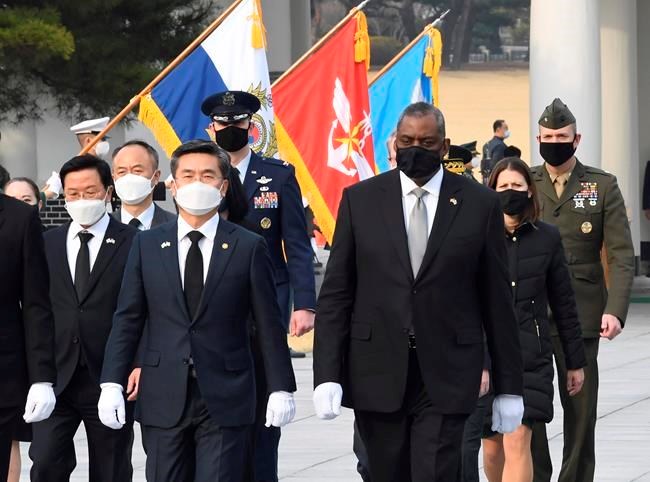SEOUL, Korea, Republic Of ŌĆö After giving the Biden administration the silent treatment for two months, North Korea this week marshalled two powerful women to warn Washington over combined military exercises with South Korea and the diplomatic consequences of its ŌĆ£hostileŌĆØ policies toward Pyongyang.
The frustration and belligerence, however, may actually be an overture.
North KoreaŌĆÖs first comments toward the new U.S. government, while filled with angry rhetoric, can be seen as the start of a diplomatic back-and-forth as the North angles to get back into stalled talks aimed at leveraging its nuclear weapons for badly needed economic benefits.
The timing of the North Korean statements was carefully chosen, with the comments landing on front pages and newscasts as U.S. Secretary of State Antony Blinken and
Whether any negotiations happen may depend on the Biden administration's policy review on North Korea, which is expected to be completed in coming weeks.
___
WHAT NORTH KOREA IS SAYING
On Tuesday, Kim Jong UnŌĆÖs powerful sister berated the latest U.S.-South Korean military exercises, which were scheduled to end a nine-day run on Thursday.
Describing the drills as an invasion rehearsal, Kim Yo Jong warned Washington to ŌĆ£refrain from causing a stinkŌĆØ if it wants to ŌĆ£sleep in peaceŌĆØ for the next four years.
North Korean First Vice Foreign Minister Choe Sun Hui said in a statement Thursday that the North will continue to ignore U.S. offers for talks unless it abandons what the North describes as hostile policies.
Choe was responding to BlinkenŌĆÖs comments this week that Washington reached out to the North through several channels starting in mid-February but hasn't received any response.
ŌĆ£What has been heard from the U.S. since the emergence of the new regime is only a lunatic theory of ŌĆśthreat from North KoreaŌĆÖ and groundless rhetoric about ŌĆścomplete denuclearization,ŌĆÖŌĆØ Choe said, calling the American offers for talks a ŌĆ£time-delaying trick.ŌĆØ
___
WHAT PYONGYANG WANTS
ChoeŌĆÖs statement could be an attempt by the North to create an environment to reenter nuclear negotiations from a position of strength, according to Shin Beomchul, an analyst with the Seoul-based Korea Research Institute for National Strategy.
Negotiations between Washington and Seoul have stalled for more than two years since the collapse of nuclear summitry between Kim Jong Un and former U.S. President Donald Trump in 2019. The two sides disagreed over the details of a plan to exchange sanctions relief for disarmament. Pyongyang has repeatedly claimed it wonŌĆÖt engage in meaningful talks while Washington persists with sanctions and pressure.
ŌĆ£ItŌĆÖs clear the North is trying to strengthen its bargaining power,ŌĆØ Shin said.
But North Korea could also be gearing up for harsher words for the Biden administration over Blinken's repeated condemnation in Seoul of the NorthŌĆÖs human rights record, something Trump largely ignored while pursuing media-friendly summits with Kim. That could complicate any future negotiations
The North is extremely sensitive to outside criticism over its abysmal human rights conditions, which it sees as an attack on its leadership, and ChoeŌĆÖs statement appeared to be crafted before the North could decide on a response to BlinkenŌĆÖs remarks.
ŌĆ£ThereŌĆÖs probably going to be serious opposition from the NorthŌĆØ over Blinken's human rights comments, said Park Won Gon, a professor of North Korea studies at SeoulŌĆÖs Ewha Womans University.
___
TALKS AND PRESSURE
Most experts agree that the North will eventually attempt to return to negotiations to try to win aid, but they differ over when ŌĆö and what it would take for talks to resume.
Kim has recently been defiant about advancing a nuclear arsenal he sees as his strongest guarantee of survival. He has also urged his people to be resilient in the struggle for economic self-reliance while launching a new multiyear plan to salvage his broken economy.
KimŌĆÖs focus on his domestic economic drive could mean that the North stays away from talks for another year and comes back only after it becomes clear that KimŌĆÖs new policies are failing, Shin said.
ŌĆ£If North Korea is really desperate for a quick resumption of talks, they would test-fire an intercontinental ballistic missile around April 15,ŌĆØ the birthday of KimŌĆÖs state-founding grandfather Kim Il Sung, to pressure Washington into talks, Shin said.
But he said itŌĆÖs more likely that the North will avoid provoking the Biden administration ŌĆö and inviting more pressure ŌĆö because KimŌĆÖs priority is to quietly cement his country as a nuclear power, which is also a key purpose of his domestic economic drive.
The North might still try to conduct short-range test launches that threaten South Korea but not the American homeland. But, Shin said, ŌĆ£they will keep any dramatic action on hold at least until the Biden administrationŌĆÖs North Korea policy review is out."
Kim must navigate the tricky relationship with Washington while his nation faces sanctions, pandemic border closures and crop-killing natural disasters that may be pushing the North toward worse economic instability.
Whatever moves the North makes, its recent messages signal that it wonŌĆÖt return to talks unless the United States offers at least some level of sanctions relief. That, however, is unlikely to happen without a meaningful cutback in KimŌĆÖs nuclear capabilities.
Kim Tong-Hyung, The Associated Press



